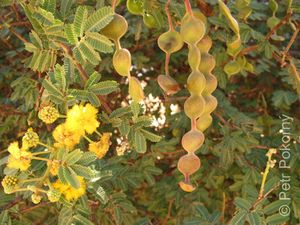Note: This is a project under development. The articles on this wiki are just being initiated and broadly incomplete. You can Help creating new pages.
Acacia nilotica - Aaavartaki
Acacia nilotica is a medium-sized deciduous tree that is armed with sharp, long spines. Stems and branches usually dark to black coloured, fissured bark, grey-pinkish slash, exuding a reddish low quality gum.
Uses
Sexual problems, Eye diseases, Heal wounds, Bleeding of the uterus, Liver problems, Jaundice, Throat problems, Stomach problems, Hair problems, Skin problems.
Parts Used
Chemical Composition
Polysaccharide Arabin (Mixture of calcium, magnesium and potassium salts of arabic acid).Arabic acid on hydrolysis gives D-galactose, L-arabinose, L-rhamnose and D-glucoronic acid.Also contain enzyme oxidase and peroxidase.[1]
Common names
| Language | Common name |
|---|---|
| Kannada | Babli |
| Hindi | Babool |
| Malayalam | Karivelam |
| Tamil | karuvelai |
| Telugu | Nalla tumma |
| Marathi | NA |
| Gujarathi | NA |
| Punjabi | NA |
| Kashmiri | NA |
| Sanskrit | Aaavartaki |
| English | Gum Arabic |
Properties
Reference: Dravya - Substance, Rasa - Taste, Guna - Qualities, Veerya - Potency, Vipaka - Post-digesion effect, Karma - Pharmacological activity, Prabhava - Therepeutics.
Dravya
Rasa
Kashaya (Astringent)
Guna
Guru (Ruksha)
Veerya
Sheeta (Cold)
Vipaka
Katu (Pungent)
Karma
Kapha
Prabhava
Habit
Identification
Leaf
| Kind | Shape | Feature |
|---|---|---|
| alternate | stipulate | stipules modified into ½ to 2" long straight, white spines, petiolate, compound, bipinnate and paripinnate, pinnae 5-7 pairs, pinnules 10-20 pairs, sessile or subsessile, minute, ovate or oblong, entire, unicostate reticulate. |
.[2]
Flower
| Type | Size | Color and composition | Stamen | More information |
|---|---|---|---|---|
| bisexual | 2.5 cm long | bright yellow | 4 or 5 petals | Flowers tiny, clustered together in bright-yellow, round heads, Bracteate, ebracteolate, sessile or subsessile, complete, actinomorphic, hermaphrodite, hypogynous, pentamerous, yellow, very small |
Fruit
| Type | Size | Mass | Appearance | Seeds | More information |
|---|---|---|---|---|---|
| lomentum | up to 8cm long | A lomentum, pods linear-oblong, glaucous-green, jointed, joints nearly orbicular, compressed, minutely hairy | 12-20 seeds | {{{5}}} | {{{6}}} |
Other features
List of Ayurvedic medicine in which the herb is used
Where to get the saplings
Mode of Propagation
How to plant/cultivate
Seeds are generally directly sown, seeds may require scarification. [4]
Commonly seen growing in areas
Photo Gallery
References
- ↑ "Chemical constituents"
- ↑ "morphology"
- ↑ Cite error: Invalid
<ref>tag; no text was provided for refs namedAyurvedic preparations - ↑ "Cultivation details"
External Links
- Pages with reference errors
- Ayurvedic Herbs known to be helpful to treat Sexual problems
- Ayurvedic Herbs known to be helpful to treat Eye diseases
- Ayurvedic Herbs known to be helpful to treat Heal wounds
- Ayurvedic Herbs known to be helpful to treat Bleeding of the uterus
- Ayurvedic Herbs known to be helpful to treat Liver problems
- Ayurvedic Herbs known to be helpful to treat Jaundice
- Ayurvedic Herbs known to be helpful to treat Throat problems
- Ayurvedic Herbs known to be helpful to treat Stomach problems
- Ayurvedic Herbs known to be helpful to treat Hair problems
- Ayurvedic Herbs known to be helpful to treat Skin problems
- Herbs with Fruits used in medicine
- Herbs with Niryaas used in medicine
- Herbs with Leaves used in medicine
- Herbs with common name in Kannada
- Herbs with common name in Hindi
- Herbs with common name in Malayalam
- Herbs with common name in Tamil
- Herbs with common name in Telugu
- Herbs with common name in Sanskrit
- Herbs with common name in English
- Habit - Tree
- Index of Plants which can be propagated by Seeds
- Index of Plants which can be propagated by Cuttings
- Herbs that are commonly seen in the region of Wild forest area
- Herbs that are commonly seen in the region of Dry arid area
- Herbs that are commonly seen in the region of Agricultural land
- Herbs
- Ayurvedic herbs that don't have seed photos
- Fabaceae








